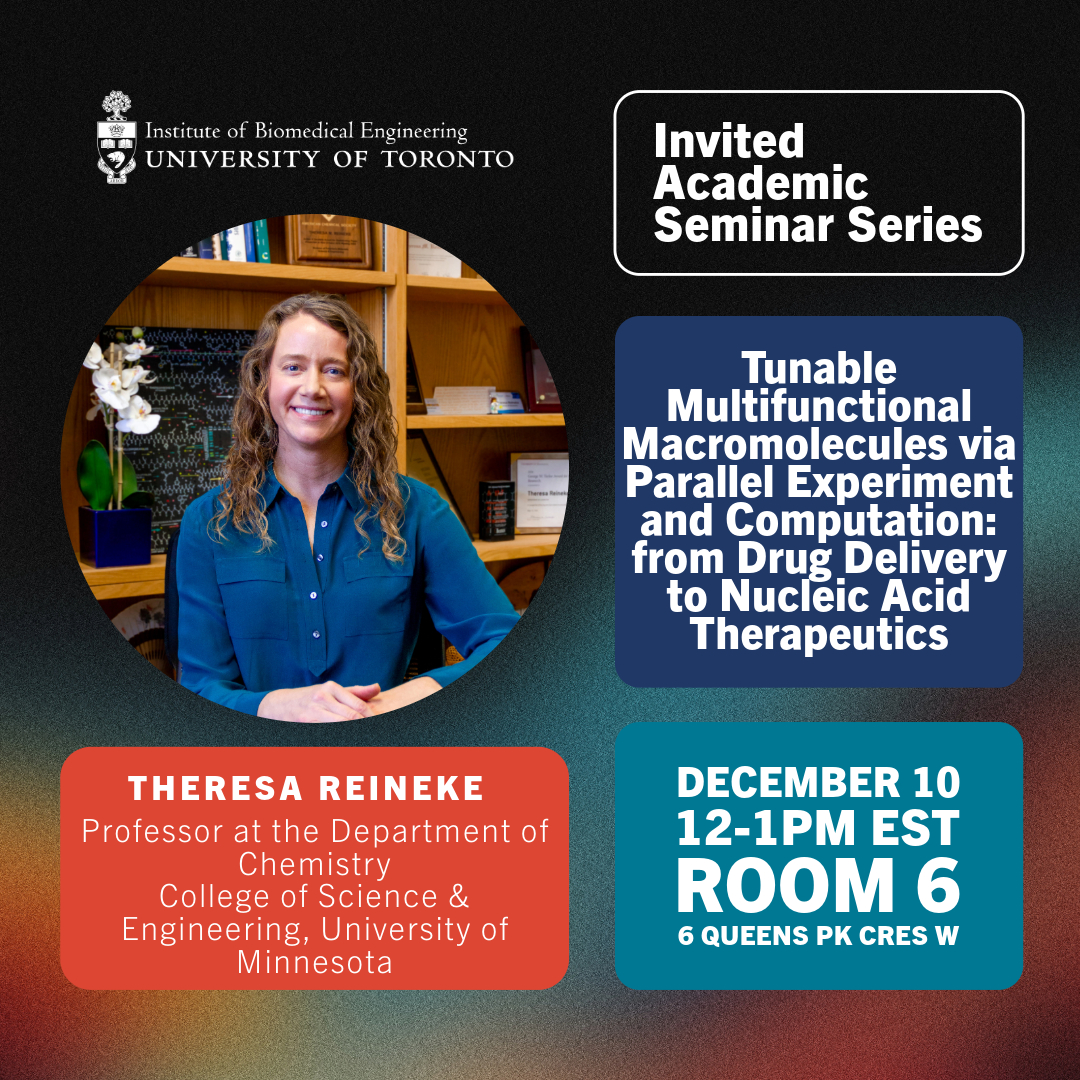
- This event has passed.
Tunable Multifunctional Macromolecules via Parallel Experiment and Computation: from Drug Delivery to Nucleic Acid Therapeutics – Theresa Reineke

Speaker
Theresa Reineke
Professor
Department of Chemistry
College of Science & Engineering
University of Minnesota
Abstract
Multifunctional macromolecules have a tremendous impact on a multitude of applications. For example, the development of polymer excipients can improve the solubility and bioavailability of intractable drugs, nucleic acid delivery vehicles have promise to promote selective genome editing, and materials from sustainable monomers may lower the environmental impact of plastics. While the materials function is diverse across these fields, the synthetic principles are similar and should be readily tunable for each specific application while remaining biologically and environmentally benign. Modern polymer chemistry and engineering offers numerous pathways for tailorable materials development and a multitude of rich monomer functionality (high heteroatom content and stereochemistry), composition, molecular weight, and architecture (linear, statistical, block, brush), where engineering is now hindered by the infinite design space. To this end, we have coupled parallel experimental workflows with computation and/or machine learning to effectively understand structure-activity trends, mechanisms, and rapidly discover high performance structures. For example, we have applied these techniques to design delivery vehicles for Cas9 ribonucleoprotein (RNP), plasmid (pDNA), and combination payloads. A library of statistical copolymers has been synthesized and systematic variations in physicochemical properties and trends for encapsulation/delivery of RNP and pDNA payloads were examined in parallel. Structure-function correlations underlying cellular internalization, editing efficiency, gene expression, and cellular toxicity of the polymer-payload formulations were probed through machine learning approaches. This workflow allowed rapid identification of successful architectures that outperform commercial reagents, achieving nearly 60% editing efficiency via non-homologous end-joining. Furthermore, the data set allowed us to uncover the physicochemical basis of delivery performance, offering understanding of divergent requirements for successful delivery of RNP and plasmid payloads. Our work demonstrates the power of combinatorial synthesis and high-throughput characterization methodologies coupled with data science approaches to discover promising macromolecules and structure-property relationships that would have otherwise remained inaccessible to intuition.
Biography
Theresa M. Reineke is the Prager Endowed Chair in Macromolecular Science and a Distinguished McKnight University Professor in the Department of Chemistry at the University of Minnesota. She also holds graduate faculty appointments in the Departments of Chemical Engineering/Materials Science and Pharmaceutics. She received a B.S. Degree from the University of Wisconsin-Eau Claire, a M.S. Degree from Arizona State University, and a Ph.D. from the University of Michigan. She then received a National Institutes of Health Postdoctoral Research Fellowship for her work in gene therapy at the California Institute of Technology prior to beginning her independent faculty career. Her research group is focused on enabling fundamental and applied technology advancements in the fields of macromolecules for nucleic acid delivery and gene editing, oral delivery of therapeutics, and sustainability. She has published over 200 peer-reviewed manuscripts and patents and manages a large group of researchers supported by several corporate, private and national funding agencies. Reineke is a Fellow of the American Chemical Society, Royal Society of Chemistry, along with the Kavli and Alfred P. Sloan Foundations. She has received numerous awards, including in the 2005 National Science Foundation CAREER and Beckman Foundation Young Investigator Awards, 2008 Camille and Henry Dreyfus Teacher-Scholar Award, 2009 National Institutes of Health Director’s New Innovator Award, 2012 Outstanding New Investigator Award from the American Society of Gene and Cell Therapy, 2017 Carl S. Marvel Creative Polymer Chemistry Award from the American Chemical Society Division of Polymer Chemistry, 2018 DuPont Nutrition and Health Sciences Excellence Medal, and 2022 Arthur C. Cope Scholar Award from the American Chemical Society. Reineke has also served for 11 years as an Associate Editor for the journals ACS MacroLetters and Chemical Science and in 2023 became Editor-in Chief of Bioconjugate Chemistry. Further, Reineke has cofounded three biotech companies in the field of nucleic acid delivery: Techulon, Inc., Nanite, Inc., and LiberateBio, Inc.